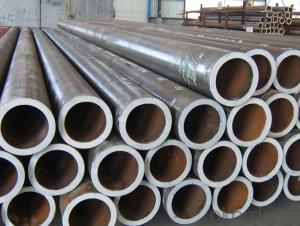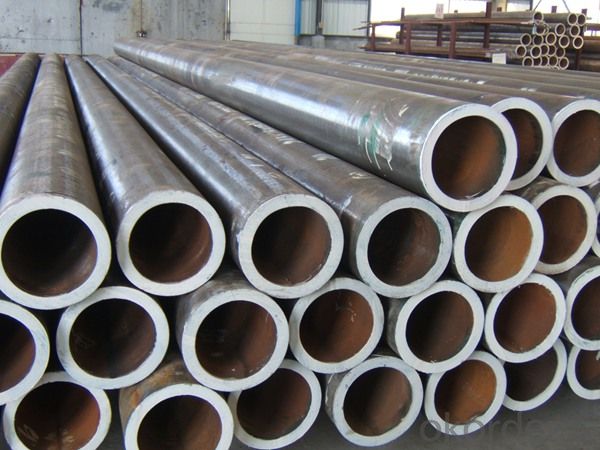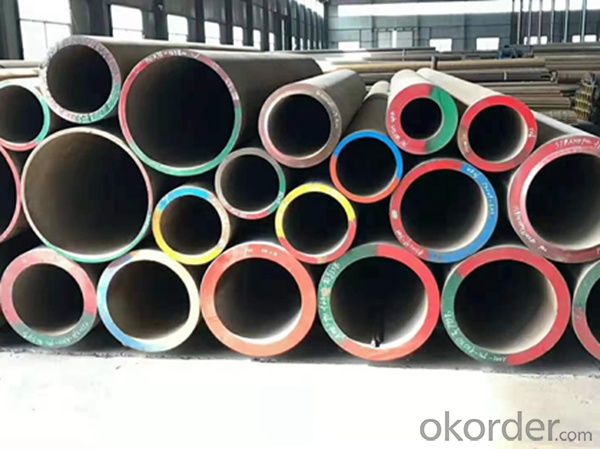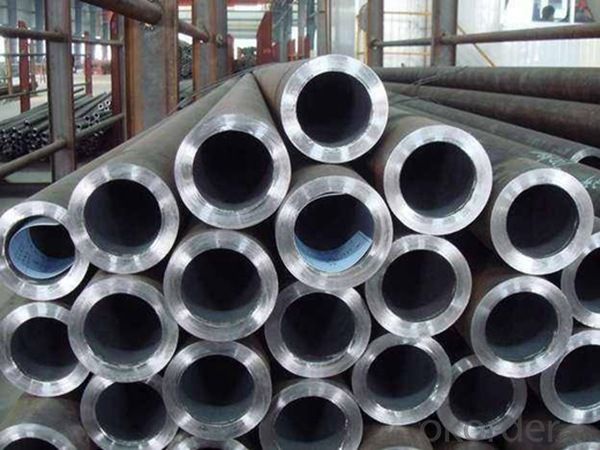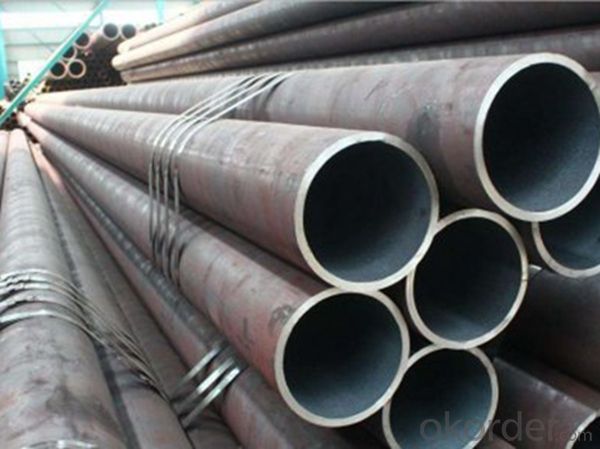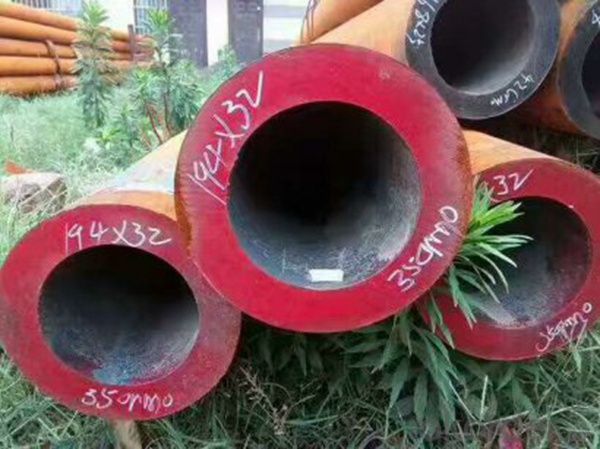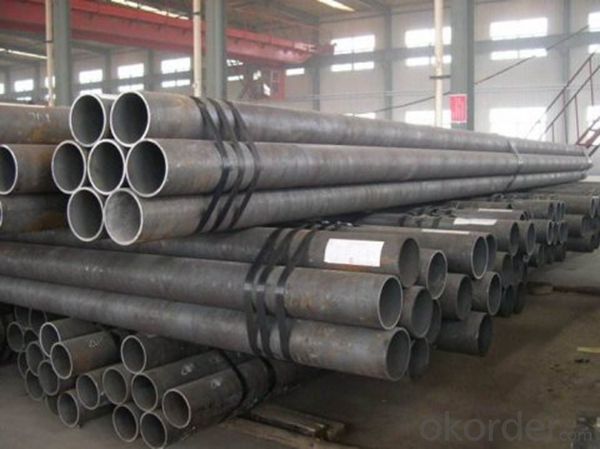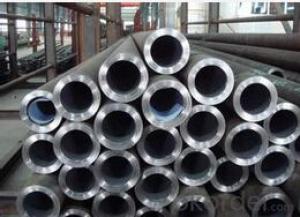20G carbon steel tube high pressure boiler petroleum cracking large diameter alloy steel tube
- Loading Port:
- Tianjin
- Payment Terms:
- TT OR LC
- Min Order Qty:
- 1 m.t.
- Supply Capability:
- 1000 m.t./month
OKorder Service Pledge
OKorder Financial Service
You Might Also Like
Specification
Product information
Product number: 15CrMoG
Executive standard: gb5310-2008
Chemical composition:
| C | Si | Mn | P | S |
| 0.12~0.18 | 0.15~0.40 | 0.40~0.70 | ≤0.025 | ≤0.025 |
| Cr | Mo | |||
| 0.80~1.20 | 0.45~0.60 |
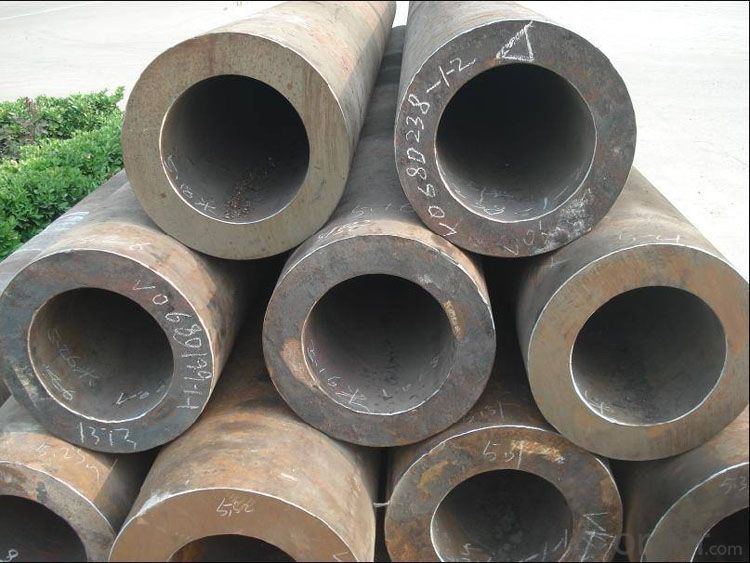
Product application: usually 15CrMo steel is mainly used for high pressure pipe and steam guide pipe with steam parameter of 510℃, heat exchanger pipe with wall temperature of 550℃, etc.
Treatment process: hot rolling
Theoretical weight scale (unit: kg/m, mm) : (outer diameter - wall thickness)* wall thickness *0.02483=kg/ m (weight per meter)
Foreign similar type of steel, the former Soviet union's 15XM, American brand T12, P12, Japanese brand STBA22, STPA22 and German brand 13CrMo44 and so on.
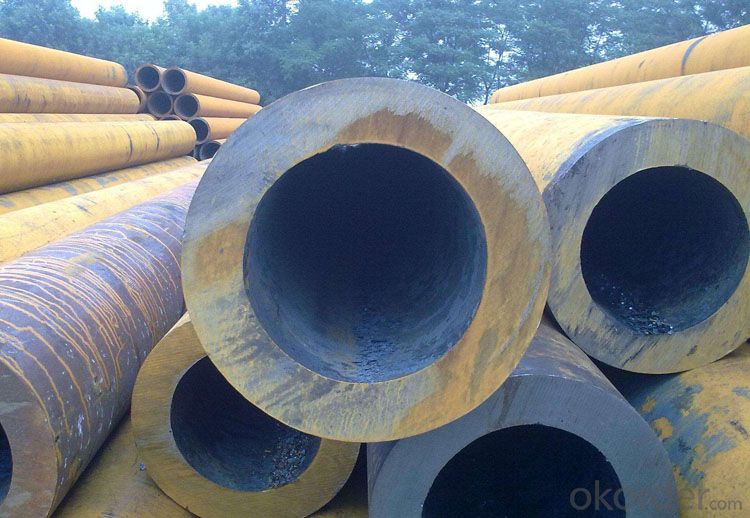
15CrMo steel is widely used in the power industry. It has high thermal strength when used at 500℃-550℃.When the service temperature is greater than 550℃, its thermal strength performance is significantly reduced.Generally, 15CrMo steel is mainly used for high pressure pipe and steam guide pipe with steam parameters of 510℃ and heat exchanger pipe with wall temperature of 550℃
Company introduction:
Our company is a new force established by the Pipeline Industry Group in the 1980s. It relies on a large number of core technologies accumulated by the Group, together with strict quality control, physical and chemical testing, and carries out professional pipe fittings management in strict accordance with various standards. Products are widely used in petroleum, petrochemical, chemical, thermal power, boilers, four major pipelines, fertilizer, aviation nuclear power, metallurgy, shipbuilding, machinery and military fields.
Our company's main products mainly include elbows, elbows, tees, diameter pipes, pipe caps, sharp elbows, flanges, socket fittings, forged pipe fittings and difficult pipe fittings. In addition, our company has alloy steel pipe and seamless steel pipe for high-pressure boiler all the year round. After 10,000 tons of medium and low pressure boiler pipes, low temperature steel pipes and pipeline steel pipes.
All products adopt national standard: GB, DL695, GD87, GD2000, SH, HG and American standard ASME (ANSI), German standard DIN, Japanese standard JIS and other standards, and our company solemnly promises that all the company's pipe parts in accordance with the standard piece by piece for geometric size and appearance testing, ultrasonic thickness measurement, ultrasonic non-destructive testing, magnetic powder, coloring penetration and other tests, while our company resolutely takes the market as the test. Oriented, facing the following customized pipe fittings and difficult pipe fittings of customers, we also adopt the attitude of excellence in production, which has been well received by customers at home and abroad for many years, and has established a very high reputation in the same industry.
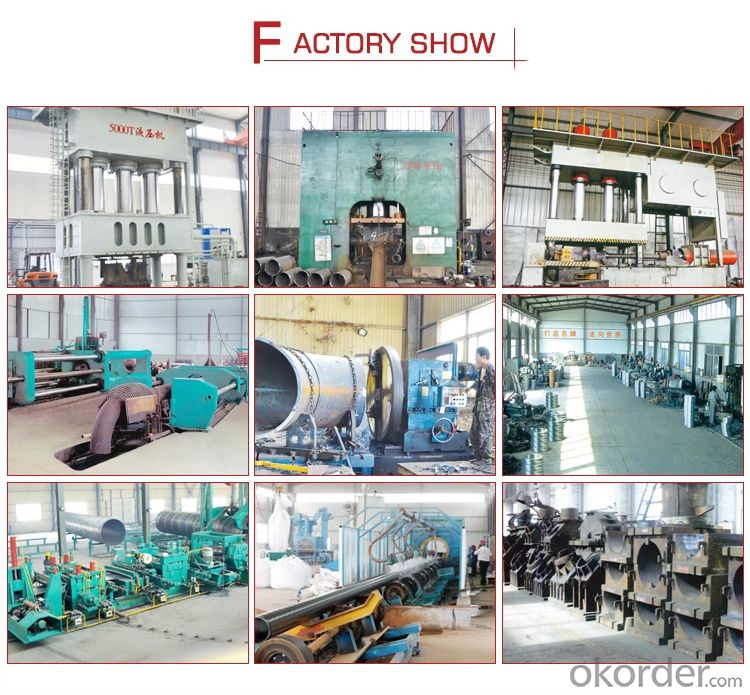
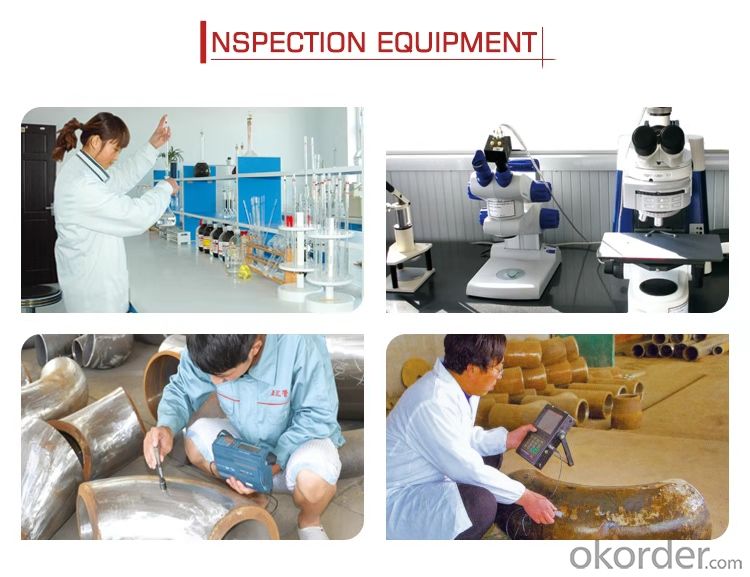
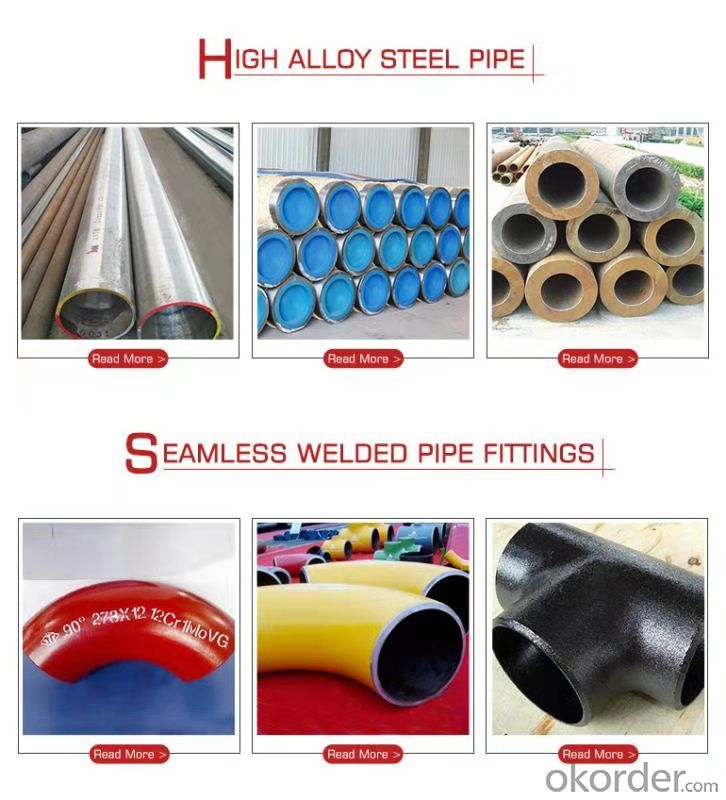

- Q: How are steel pipes insulated to prevent noise transmission?
- Steel pipes are typically insulated to prevent noise transmission by using materials such as fiberglass or mineral wool wraps. These insulating materials are wrapped around the pipes, creating a barrier that absorbs and dampens sound waves, reducing noise transmission. Additionally, acoustic lagging or jackets can also be applied to further reduce noise and vibration.
- Q: How do steel pipes handle high-pressure applications?
- Steel pipes are commonly used in high-pressure applications because of their inherent strength and durability. The high tensile strength of steel allows it to withstand the pressure exerted on the pipes without deforming or bursting. Moreover, steel pipes are resistant to corrosion, making them ideal for handling various types of fluids and gases under high-pressure conditions. Additionally, the seamless construction of steel pipes eliminates weak points and ensures their reliability and safety in high-pressure environments.
- Q: How are steel pipes affected by international trade policies?
- Steel pipes can be significantly impacted by international trade policies. These policies can include tariffs, quotas, and other trade barriers that affect the import and export of steel pipes. Changes in trade policies can lead to fluctuations in prices, supply, and demand for steel pipes. Additionally, trade policies can also influence the competitiveness of domestic steel pipe producers in the global market.
- Q: How are steel pipes used in nuclear power plants?
- Steel pipes are used in nuclear power plants for various purposes, such as transporting cooling water, steam, and other fluids, as well as for supporting and containing radioactive materials. They are crucial components in the construction of piping systems that help maintain the safe and efficient operation of nuclear reactors.
- Q: Can steel pipes be used for underground fire hydrants?
- Yes, steel pipes can be used for underground fire hydrants. Steel pipes are commonly used in underground water supply systems, including fire hydrant installations. They are known for their durability, strength, and resistance to corrosion, which makes them suitable for underground applications. Additionally, steel pipes can withstand high water pressures and provide a reliable and long-lasting solution for fire hydrant installations. However, it is essential to ensure that the steel pipes used for underground fire hydrants are properly coated or lined to prevent corrosion and maintain their structural integrity over time. Regular maintenance and inspections should also be conducted to identify and address any potential issues that may arise.
- Q: Hot galvanized steel pipe for use?
- Hot galvanized pipe: in order to improve the corrosion resistance of steel pipe, galvanized steel pipe. Galvanized steel pipe hot galvanized and galvanized two kinds, hot galvanized, zinc coating thickness, zinc plating cost is low, the surface is not very smooth.The hot-dip galvanized pipe is an alloy layer that causes molten metal to react with the iron matrix, thus combining the substrate with the two coating. Hot dip galvanizing is the first steel pickling, in order to remove iron, steel pipe surface after pickling, cleaning by ammonium chloride or zinc chloride solution or ammonium chloride and zinc chloride aqueous solution tank, and then into the hot dip tank. Hot galvanizing has the advantages of uniform coating, strong adhesion, long service life and so on. A complex physical and chemical reaction is formed between the steel tube matrix and the molten plating solution to form a corrosion resistant structure with a tight zinc - iron alloy layer. The alloy layer is integrated with the pure zinc layer and the steel pipe matrix. Therefore, it has strong corrosion resistance.
- Q: Are steel pipes suitable for underground nuclear waste storage?
- Underground nuclear waste storage does not lend itself to the use of steel pipes due to their unsuitability. Despite their strength and durability, steel pipes are susceptible to corrosion when in contact with certain forms of nuclear waste. As time passes, the radioactive elements can corrode the steel pipes, potentially leading to leaks and the contamination of the surrounding environment. Furthermore, steel pipes lack the necessary design to endure the extreme temperatures and pressures commonly found in nuclear waste storage facilities. Consequently, alternative materials like corrosion-resistant alloys or concrete are generally employed for underground nuclear waste storage to guarantee the confinement and isolation of hazardous substances.
- Q: What are the different testing methods used for steel pipes?
- There are various testing methods used for steel pipes, including non-destructive testing methods such as ultrasonic testing, magnetic particle testing, radiographic testing, and liquid penetrant testing. These methods help detect any defects or flaws in the pipes, ensuring their quality and integrity. Additionally, destructive testing methods such as tensile testing, impact testing, and hardness testing are also used to evaluate the mechanical properties of the steel pipes.
- Q: What is the maximum temperature that steel pipes can handle?
- The maximum temperature that steel pipes can handle varies depending on the specific grade and type of steel used. However, in general, steel pipes can withstand high temperatures ranging from 750 to 1200 degrees Celsius (1382 to 2192 degrees Fahrenheit).
- Q: Are steel pipes resistant to chemicals?
- Yes, steel pipes are generally resistant to chemicals. They have excellent corrosion resistance properties, making them suitable for transporting various chemicals in industries such as oil and gas, chemical processing, and wastewater treatment. However, the level of resistance can vary depending on the specific type of chemical and the grade of steel used. In some cases, additional protective coatings may be required to enhance chemical resistance.
Send your message to us
20G carbon steel tube high pressure boiler petroleum cracking large diameter alloy steel tube
- Loading Port:
- Tianjin
- Payment Terms:
- TT OR LC
- Min Order Qty:
- 1 m.t.
- Supply Capability:
- 1000 m.t./month
OKorder Service Pledge
OKorder Financial Service
Similar products
Hot products
Hot Searches
Related keywords
